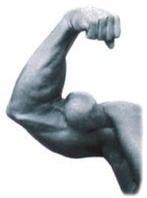Years ago, I applied to be a personal trainer in a gym. Taking one look at my runner’s body, the owner said to me, “Go work out for a couple of months and come back to reapply.” Happy as I was with my runner’s body, I never went back. But it occurred to me that most people in the fitness industry care more about what you look like than what you know. Regardless of how big your pecs or sexy your calves are, there are basic things that every fitness professional needs to know. Here’s 3 of them:
1. The science and research on weight loss. There’s a lot of propaganda in the fitness industry when it comes to weight loss, so it’s important for fitness professionals to know what’s true and what’s not. For example, although there is much talk in the fitness industry about strength training leading to an increase in resting metabolic rate, which helps clients lose weight, strength training does not chronically increase resting metabolic rate. In the absence of pathology, people lose weight only when caloric expenditure is greater than caloric intake. When that occurs, resting metabolic rate actually decreases. It is never elevated when losing weight. Each pound of muscle burns only 6 to 7 calories per day (and you can’t add that many pounds of muscle). Since weight loss is the biggest reason why people seek our help, it’s important to know the weight loss research if you’re a fitness professional. Wouldn’t you expect an oncologist to know the research on cancer treatments?
2. Specific health and fitness outcomes of different workouts and training programs. Fitness professionals need to know how to design clients’ workouts based on science and research that cause specific physiological changes and organize all of their workouts into a progressive, systematic training program that enables their clients to accomplish their specific goals and achieve greater fitness and health. Exercise contraindications, the development of muscular strength, muscular endurance, cardiovascular endurance, flexibility, and body composition all must be taken into consideration.
3. Biomechanics. Since most of the fitness industry is focused on various forms of strength training, whether it be with or without equipment and one-on-one or in a group setting, fitness professionals need to know how muscles and tendons work to move our bodies, including correct and safe techniques for exercises, lever systems, muscle architecture, contraction types, force-length and force-velocity relationships of muscle, and so on.
I wonder how much of this that gym owner knew who turned me away for a job. At least he had big biceps.
_________________________________________________
Don’t forget to join me for the Run-Fit SpecialistTM certification! Everyone who attends a live workshop has the opportunity to apply to become a Run-Fit Master Trainer in 2016! If you can’t attend a live workshop, get certified through the home-study course!

